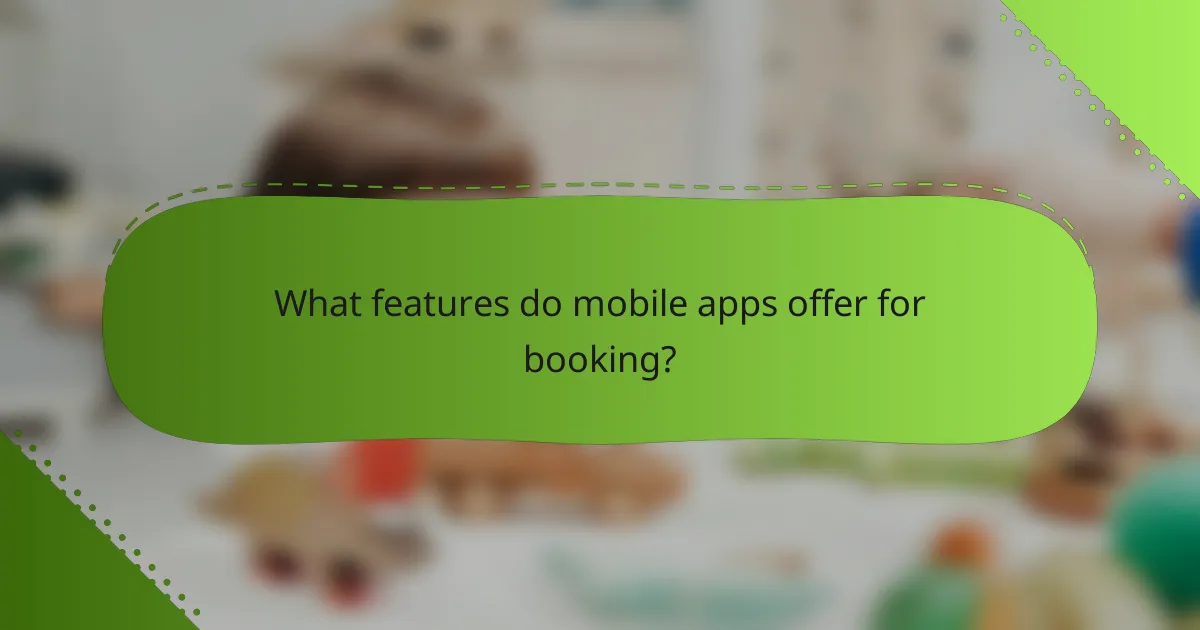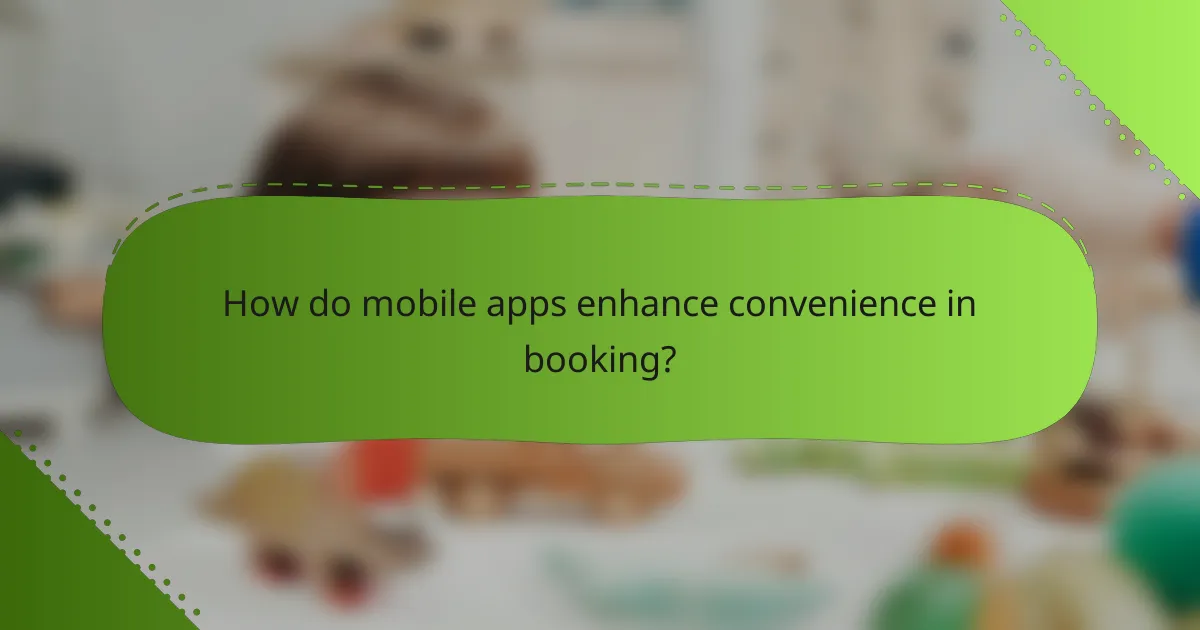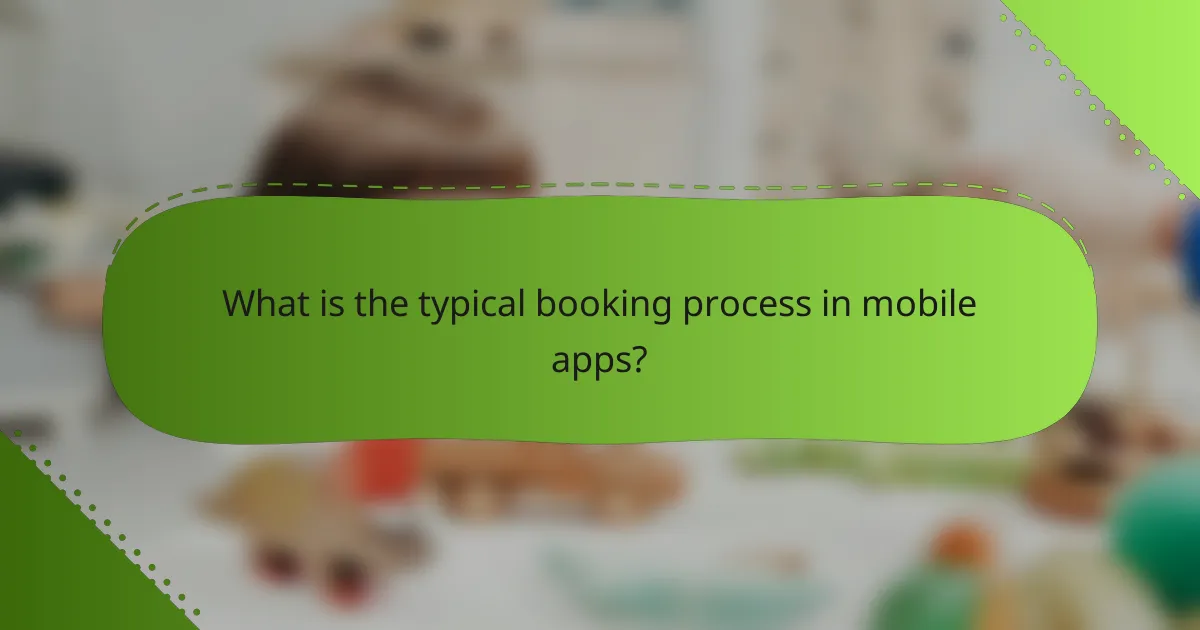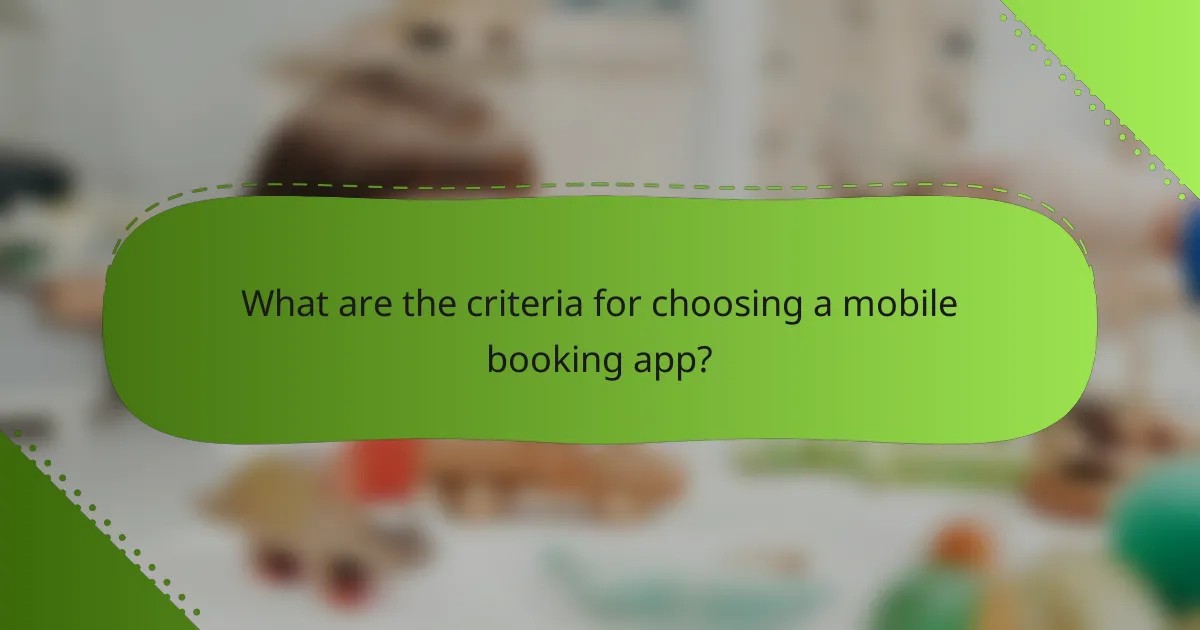Mobile apps for booking have revolutionized the way users access services, offering a variety of features that enhance convenience and efficiency. With user-friendly interfaces, real-time notifications, and secure payment options, these apps simplify the booking process, making it accessible at any time. The streamlined steps from account creation to confirmation ensure that busy individuals can make reservations quickly and effortlessly.

What features do mobile apps offer for booking?
Mobile apps for booking provide a range of features designed to enhance user experience and streamline the reservation process. Key functionalities include user-friendly interfaces, real-time notifications, secure payment options, personalized recommendations, and offline access capabilities.
User-friendly interfaces
User-friendly interfaces are essential for mobile booking apps, as they allow users to navigate easily and complete transactions quickly. Intuitive designs often include clear menus, simple icons, and straightforward booking flows that minimize confusion.
For example, a well-designed app might feature a prominent search bar, allowing users to find services or products with just a few taps. Ensuring that buttons are large enough for easy tapping can significantly enhance usability, especially on smaller screens.
Real-time notifications
Real-time notifications keep users informed about their bookings, changes, and promotions. These alerts can include confirmation messages, reminders for upcoming reservations, or updates on delays and cancellations.
For instance, a travel app may send push notifications about flight status changes, allowing travelers to adjust their plans promptly. Users should enable notifications to benefit fully from this feature, ensuring they receive timely information.
Secure payment options
Secure payment options are crucial for building trust in mobile booking apps. Users should look for apps that offer multiple payment methods, including credit/debit cards, digital wallets, and bank transfers, all secured with encryption technologies.
Additionally, apps that comply with PCI DSS (Payment Card Industry Data Security Standard) regulations help ensure that users’ financial information remains safe during transactions. Users should always verify the app’s security measures before entering payment details.
Personalized recommendations
Personalized recommendations enhance the booking experience by suggesting services or products based on user preferences and past behavior. This feature can help users discover new options that align with their interests.
For example, a hotel booking app might recommend accommodations based on previous stays or user ratings. Users can often customize their profiles to improve the accuracy of these suggestions, leading to a more tailored experience.
Offline access capabilities
Offline access capabilities allow users to view their bookings and important information without an internet connection. This feature is particularly useful for travelers in areas with limited connectivity.
Many apps enable users to download itineraries or reservation details in advance, ensuring they have access to essential information when needed. Users should check if the app offers offline functionality and how to utilize it effectively.

How do mobile apps enhance convenience in booking?
Mobile apps significantly enhance convenience in booking by providing users with quick and easy access to services at their fingertips. They streamline the entire booking process, making it faster and more efficient, which is particularly beneficial for busy individuals.
Instant access to services
Mobile apps offer instant access to various services, allowing users to book appointments, make reservations, or purchase tickets with just a few taps. This immediacy eliminates the need for lengthy phone calls or website navigation, saving valuable time.
For example, a user can book a table at a restaurant or schedule a ride within seconds, often with real-time availability displayed. This immediate access is especially useful during peak times when waiting for a response can be frustrating.
24/7 availability
Mobile apps provide 24/7 availability, enabling users to make bookings at any time, day or night. This flexibility caters to different schedules and time zones, accommodating both early risers and night owls.
For instance, someone can book a hotel room late at night without having to wait for business hours. This round-the-clock access ensures that users can secure services whenever they need them, enhancing overall convenience.
Streamlined booking processes
Mobile apps streamline booking processes by minimizing the number of steps required to complete a transaction. Users can often save their preferences and payment information, allowing for quicker checkouts in future bookings.
Many apps incorporate features like one-click booking or saved itineraries, which significantly reduce the time spent on repetitive tasks. This efficiency is particularly advantageous for frequent travelers or regular service users.
Integration with calendars
Integration with calendars is a key feature of many mobile apps, allowing users to sync their bookings directly with personal schedules. This ensures that appointments and reservations are easily accessible and reminders can be set automatically.
For example, a user can book a flight and have it automatically added to their Google Calendar, reducing the risk of double-booking or forgetting important dates. This integration enhances organization and helps users manage their time effectively.

What is the typical booking process in mobile apps?
The typical booking process in mobile apps involves several key steps, including account creation, service selection, payment processing, and confirmation. Each step is designed to streamline the user experience, making it easy to book services quickly and efficiently.
Account creation and login
To begin using a mobile app for booking, users must create an account or log in if they already have one. This often involves providing basic information such as name, email, and phone number, and may require verification through email or SMS.
Many apps offer social media login options, allowing users to sign in quickly without creating a new password. However, it’s essential to use strong passwords and enable two-factor authentication when available to enhance security.
Service selection
After logging in, users can browse available services tailored to their needs. This may include filtering options based on location, price range, or service type, making it easier to find the desired offering.
Users should carefully review service details, including descriptions, pricing, and user reviews, to ensure they make informed choices. Some apps may also provide recommendations based on previous bookings or preferences.
Payment processing
Once a service is selected, users proceed to payment processing, where they can choose from various payment methods, such as credit cards, digital wallets, or bank transfers. It’s crucial to ensure that the app uses secure payment gateways to protect sensitive information.
Many apps allow users to save payment details for future bookings, which can speed up the process. However, users should regularly review saved payment methods for security and accuracy.
Confirmation and follow-up
After completing the payment, users receive a confirmation of their booking, typically via email or in-app notification. This confirmation includes essential details such as service time, location, and any cancellation policies.
Follow-up communications may include reminders as the booking date approaches, along with options for rescheduling or canceling the service. Users should keep an eye on these notifications to avoid missing important updates or deadlines.

What are the criteria for choosing a mobile booking app?
When selecting a mobile booking app, consider user reviews, feature sets, and security measures. These criteria help ensure the app meets your needs for convenience, functionality, and safety during the booking process.
User reviews and ratings
User reviews and ratings provide insights into the app’s performance and reliability. Look for apps with high ratings, typically above four stars, and read through recent reviews to gauge user satisfaction and any recurring issues.
Pay attention to the volume of reviews as well; an app with hundreds of reviews may offer more reliable feedback than one with only a few. Look for comments on the booking experience, customer support, and ease of use.
Feature set comparison
Comparing the feature sets of different booking apps is crucial for finding one that suits your needs. Key features to consider include search filters, payment options, cancellation policies, and customer support availability.
Some apps may offer unique features like price alerts, loyalty programs, or integrated travel itineraries. Make a list of must-have features and compare how different apps stack up against each other.
Security measures
Security measures are essential for protecting your personal and financial information when using a mobile booking app. Look for apps that use encryption protocols, such as SSL, to safeguard your data during transactions.
Additionally, check if the app complies with relevant regulations, such as GDPR in Europe or PCI DSS for payment processing. Apps that offer two-factor authentication can provide an extra layer of security, making them a safer choice for booking travel.

What are the emerging trends in mobile booking apps?
Emerging trends in mobile booking apps focus on enhancing user experience, personalization, and integration with advanced technologies. Features like AI-driven recommendations, seamless payment options, and real-time updates are becoming standard, making the booking process more efficient and user-friendly.
Personalization and AI Integration
Personalization in mobile booking apps is increasingly driven by artificial intelligence, which analyzes user behavior to tailor recommendations. This means users can receive suggestions for hotels, flights, or activities based on their previous choices and preferences.
AI chatbots are also becoming common, providing instant customer support and helping users navigate the booking process. This reduces wait times and enhances user satisfaction by offering immediate assistance.
Seamless Payment Solutions
Mobile booking apps are integrating various payment solutions to streamline transactions. Options like digital wallets, one-click payments, and cryptocurrency are gaining traction, allowing users to complete bookings quickly and securely.
Offering multiple payment methods caters to a broader audience, especially in regions where certain payment types are preferred. For instance, in Europe, SEPA transfers are popular, while in the U.S., credit cards remain dominant.
Real-Time Updates and Notifications
Real-time updates are essential for keeping users informed about their bookings. Mobile apps now provide notifications for flight changes, hotel check-in times, and special offers, ensuring users have the latest information at their fingertips.
These notifications can significantly enhance the travel experience by allowing users to adjust their plans promptly. Users should enable push notifications to take full advantage of this feature and avoid missing important updates.
